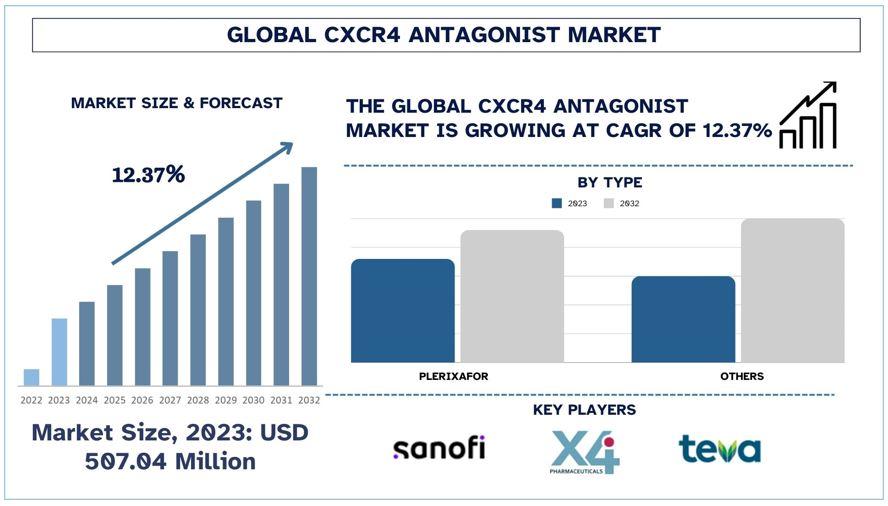CXCR4 Antagonists Market Analysis by Size, Share, Growth, Trends and Forecast (2024–2032) | UnivDatos

According to the Univdatos Market Insights analysis, the rise in prevalence of cancer, and HIV, increasing penetration of CXCR4 antagonists, expansion of combination therapy, and increasing focus towards research and development drive the CXCR4 antagonist market. As per their “CXCR4 antagonists Market” report, the global market was valued at USD 507.04 million in 2023, growing at a CAGR of about 12.37% during the forecast period from 2024 - 2032 to reach USD million by 2032. CXCR4 antagonists are drugs that block the CXCR4 receptor, a protein associated with cancer spread and HIV/AIDS. AMD 3100, which is also known as plerixafor, is the most widely used CXCR4 antagonist that has been approved to mobilize the stem cells of hematopoietic origin in cancer patients. Other potential CXCR4 antagonists are mavorixafor (XOLREMDI) and BL-8040. XOLREMDI was recently launched by X4 Therapeutics Inc. and has recently been approved for WHIM syndrome treatment.
Access sample report (including graphs, charts, and figures) - https://univdatos.com/get-a-free-sample-form-php/?product_id=68257
Increasing Prevalence and Incidence of Cancer is driving high demand in North America
Due to the rising incidence of cancer in North America, the need for CXCR4 antagonist medicines has been rapidly increasing. The CXCR4 receptor is particularly important in the process of metastatic cancer since it helps to move cancer cells to other places within the body. With growing cases of different cancers such as breast, lung, and prostate cancers, there has been an increased demand for treatment that can be able to target these proteins. The North America region is predicted to be a very large market for CXCR4 antagonists. This growth is attributed to factors such as enhanced transparency in clinical trials, patient centricity in healthcare policies, and chemotherapy resistance in treatments. Also, the expected growth in the variety of applications of CXCR4 antagonists in conditions such as HIV and autoimmune diseases would foster the market’s growth in the future.
Growing Initiatives to control HIV incidence in the United States
HIV is still a public health problem worldwide; it continues to impact millions of people and needs the attention of health authorities. The HIV.gov states that 1.2 million people in the United States of America have HIV. They also estimated that there were 31,800 new HIV infections in the United States in the year 2022. Due to this, the targeted prevention measures, together with the necessary focus on education, affordable and quality healthcare, and support services for people with HIV should remain the priority to prevent new cases and to enhance the future lives of those affected by HIV. In conclusion, the epidemic is a real threat that needs commitment and resources now and in the future. In regard to this, various measures have been undertaken by the U.S. government to augment and enhance the development of therapeutics like CXCR4 antagonist-based drugs to the market.
For instance, in 2020, “Ending the HIV Epidemic (EHE) Initiative” was launched by United States federal government. This initiative aims to reduce new HIV infections by 90% by 2030. The federal government has invested significantly, including a request for $850 million in FY 2024 to support various HIV prevention and treatment programs.
Increasing Prevalence of Cancer is driving high demand in Canada
Cancer has become more prevalent in Canada, and therefore there is a need to come up with new treatments like CXCR4 antagonists. Given the increase in cancer incidence, there is a pressing need to develop appropriate treatments for different types of cancer. For instance, according to “GLOBOCAN 2022” statistics, there is a rise in colorectal cancer among younger adults (younger than 50 years at diagnosis) in many high-income countries, including the United States, Canada, and Australia, with the incidence rising by 1%–4% per year. CXCR4 antagonists are being developed for the treatment of oncology since the receptor is involved in controlling growth and metastatic patterns. In recent years targeted CXCR4, investigations have revealed that targeting the CXCR4 receptor can improve the effectiveness of conventional therapies for treatment, including chemotherapy, by interrupting the tumor microenvironment conditioning process. For instance, observations show that CXCR4 antagonists decrease the migration of tumor cells and enhance the treatment outcomes from conventional treatments in cancer types such as breast and colorectal cancers.
Explore the Comprehensive Research Overview - https://univdatos.com/report/cxcr4-antagonist-market
Conclusion
The market in North America has great growth potential because the region has a high prevalence and incidence of cancer and HIV. The availability of advanced technologies such as the application of artificial intelligence in research, and the tendencies towards patient-oriented legislation affecting the healthcare market also influence the market’s growth. North America's commitment to bringing innovation in this market further escalates North America’s position as the leading region for CXCR4 antagonists market growth.
Related Healthcare Market Research Report
Antibiotic Resistance Market: Current Analysis and Forecast (2024-2032)
Software as a Medical Device Market: Current Analysis and Forecast (2024-2032)
Opioid Use Disorder (OUD) Treatment Market: Current Analysis and Forecast (2024-2032)
Elastography Imaging Market: Current Analysis and Forecast (2024-2032)
Contact Us:
UnivDatos Market Insights
Contact Number - +19787330253
Email - contact@univdatos.com
Website - www.univdatos.com
Linkedin- https://www.linkedin.com/company/univ-datos-market-insight/mycompany/
- Art
- Causes
- Crafts
- Dance
- Drinks
- Film
- Fitness
- Food
- Spiele
- Gardening
- Health
- Startseite
- Literature
- Music
- Networking
- Andere
- Party
- Religion
- Shopping
- Sports
- Theater
- Wellness
- IT, Cloud, Software and Technology


